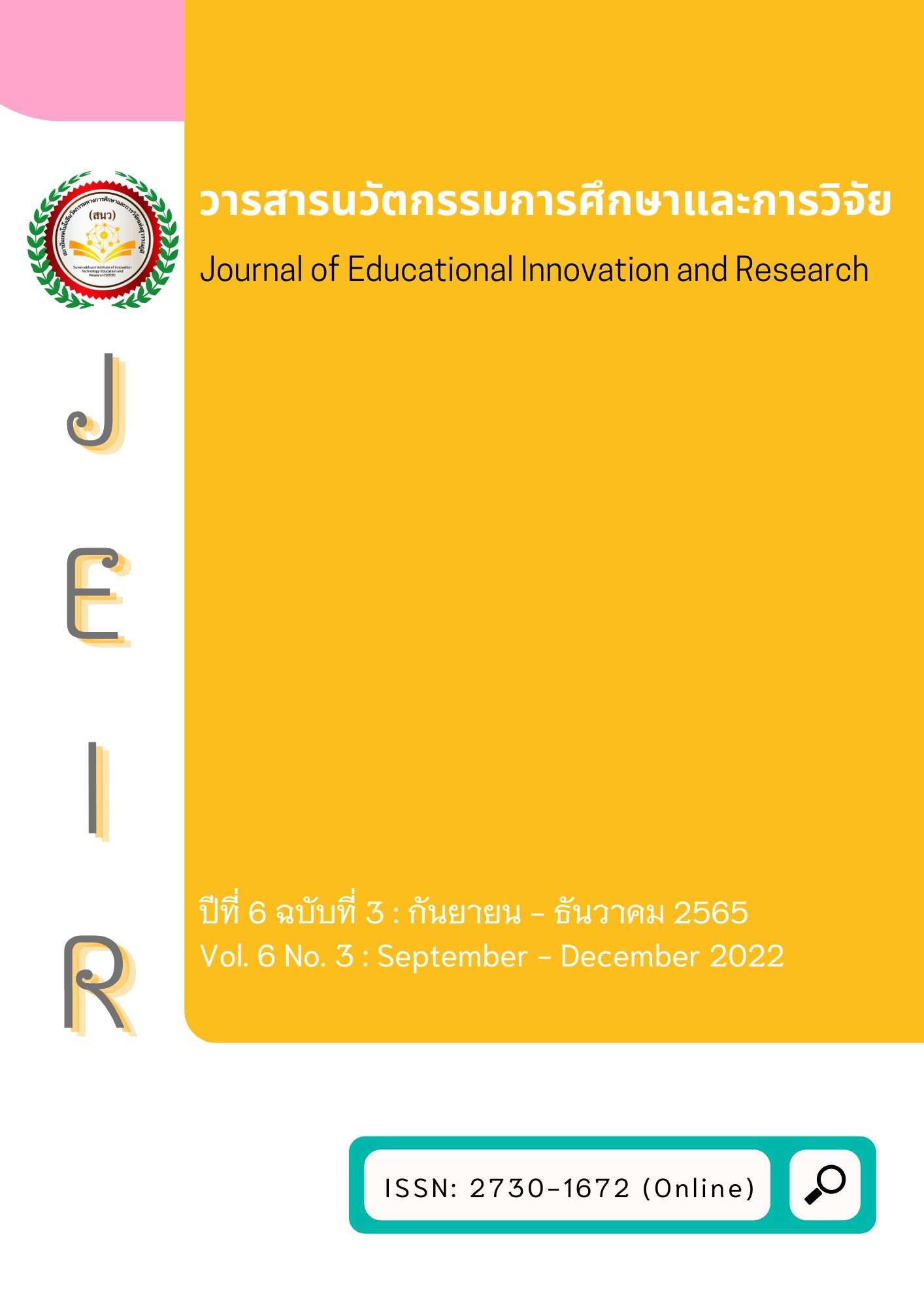การบริหารการพัฒนาชุมชนภาคตะวันออกตามแนวทางพระพุทธศาสนา
Main Article Content
บทคัดย่อ
งานวิจัยนี้มีวัตถุประสงค์ คือ 1)เพื่อศึกษาการบริหารการพัฒนาชุมชนภาคตะวันออกตามแนวทางพระพุทธศาสนา 2)เพื่อศึกษาแนวทางการเผยแพร่พระพุทธศาสนาของพระสงฆ์ต่อการพัฒนาชุมชนภาคตะวันออก และ3)เพื่อเสนอแนะการบริหารการพัฒนาชุมชนภาคตะวันออกตามแนวทางพระพุทธศาสนา เป็นการวิจัยเชิงคุณภาพด้วยวิธีการเจาะจงโดยมีผู้ให้ข้อมูลสำคัญ จำนวน 30 คน ได้แก่ เจ้าคณะจังหวัดและรองเจ้าคณะจังหวัด เจ้าอาวาสและรองเจ้าอาวาส ประธานและกรรมการวัด ผู้นำท้องถิ่นและประชาชน เก็บรวบรวมข้อมูลด้วยการสัมภาษณ์เชิงลึก แล้วนำมาพรรณนาหาข้อสรุปอย่างเป็นระบบโดยใช้การวิเคราะห์เนื้อหาการวิเคราะห์ ตีความ และหาข้อสรุปเปิดเผยแทนข้อเท็จจริงดังนี้
- การบริหารการพัฒนาชุมชนภาคตะวันออกตามแนวทางพระพุทธศาสนา ยึดหลักการพัฒนาชุมชมเข้มแข็งให้เกิดการเปลี่ยนแปลงบนพื้นฐานของความ มีจิตสำนึกมีส่วนในการพัฒนาเศรษฐกิจ
การพัฒนาชนบท การพัฒนาอุตสาหกรรม การพัฒนาชุมชน การพัฒนาศึกษา จนถึงการแก้ไขปัญหาอื่น ๆ ที่เกิดในชุมชนทำให้ชุมชนมีความสามารถที่พึ่งตนเอง ได้และมีคุณภาพชีวิตที่ดีขึ้น - แนวทางการเผยแพร่พระพุทธศาสนาของพระสงฆ์ต่อการพัฒนาชุมชนภาคตะวันออก มีผลมาจากการพัฒนาชุมชนตามการปฏิบัติกิจการคณะสงฆ์ทั้ง 6 ด้าน คือ การปกครอง ศาสนศึกษา ศึกษาสงเคราะห์ การเผยแผ่สาธารณูปการ และสาธารณสงเคราะห์ พร้อมทั้งศีลธรรมจริยธรรมเชิงพุทธอื่น ๆ ทั้งด้านกาย จิตใจ สติปัญญา สังคม เพื่อนำไปสู่ความเข้มแข็งของชุมชน
- ข้อเสนอแนะโดยอิงสิ่งที่ค้นพบจากการวิจัย โดยการพัฒนาชุมชนเป็นเครื่องมือสำคัญที่จะพัฒนาประเทศให้มีความเข้มแข็ง มีความพร้อมความสมบูรณ์ทั้งในด้านเศรษฐกิจ สังคม และการเมือง นำมาซึ่งความสงบสุขของชุมชนได้ต่อไป
Article Details

อนุญาตภายใต้เงื่อนไข Creative Commons Attribution-NonCommercial-NoDerivatives 4.0 International License.
เอกสารอ้างอิง
กรมการพัฒนาชุมชน. (2561). ข้อมูลการสำรวจคุณภาพชีวิตของคนไทยปี 2561 จากข้อมูลความจำเป็นขั้นพื้นฐาน. กรุงเทพฯ: กรมการพัฒนาชุมชน.
บุษกร เชี่ยวจินดากานต์. (2561). เทคนิคการวิจัยเชิงคุณภาพแบบกรณีศึกษา. วารสารศิลปศาสตร์ปริทัศน์ คณะศิลปศาสตร มหาวิทยาลัยหัวเฉียวเฉลิมพระเกียรติ, 13(25), 103-118.
พีระพงษ์ วรภัทร์ถิระกุล. (2564). ภาวะผู้นำ และวัฒนธรรมองค์การที่มีผลต่อคุณภาพชีวิตในการทำงานของบุคลากรสำนักงานคณะกรรมการกิจการกระจายเสียง กิจการโทรทัศน์ และกิจการโทรคมนาคมแห่งชาติ (กสทช.).วารสารวิจัยมหาวิทยาลัยเวสเทิร์น มนุษยศาสตร์และสังคมศาสตร์, 7(2), 60-71.
พระมหาสมเดช วงศ์ธรรม. (2559). พระสงฆ์นักพัฒนา: รูปแบบการใช้ภูมิปัญญาพื้นบ้านในการจัดการพัฒนาชุมชนของพระสงฆ์จังหวัดร้อยเอ็ด (วิทยานิพนธ์วัฒนธรรมศาสตรดุษฎีบัณฑิต). มหาวิทยาลัยมหาสารคาม.
พระศรีพัชโรดม (ลักษณะ กิตติญาโณ). (2560). รูปแบบการเผยแผ่พระพุทธศาสนาของพระสงฆ์ในสังคมไทย (วิทยานิพนธ์พุทธศาสตรดุษฎีบัญฑิต). มหาวิทยาลัยมหาจุฬาลงกรณราชวิทยาลัย.
พระครูปลัดเถรานุวัตร (สุเทพ ดีเยี่ยม). (2560). การเสริมสร้างความเข้มแข็งของเครือข่ายพระสงฆ์นักพัฒนาเพื่อขับเคลื่อนงานพัฒนาคุณภาพชีวิตของประชาชนภาคเหนือตอนล่าง (วิทยานิพนธ์พุทธศาสตรดุษฎีบัณฑิต). มหาวิทยาลัยมหาจุฬาลงกรณราชวิทยาลัย.
พระครูสันติธรรมาภิรัต (บุญชัย สนฺติกโร). (2558). การพัฒนารูปแบบการปกครองคณะสงฆ์ในเขตปกครองคณะสงฆ์ ภาค 15 (วิทยานิพนธ์พุทธศาสตรดุษฎีบัณฑิต). มหาวิทยาลัยมหาจุฬาลงกรณราชวิทยาลัย.
พระครูใบฎีกาสะอาด ปญฺญาทีโป (ดิษฐสวรรค์). (2558). การพัฒนาการมีส่วนร่วมของพระสงฆ์ในการส่งเสริมคุณภาพชีวิตในชุมชนในเขตปกครองคณะสงฆ์ภาค 2 (วิทยานิพนธ์พุทธศาสตรดุษฎีบัณฑิต). มหาวิทยาลัยมหาจุฬาลงกรณ์ราชวิทยาลัย.
พระราชวรมุนี (พล อาภากโร) และคณะ (2557). การขับเคลื่อนการพัฒนาการจัดหลักสูตรพระธรรมทายาท (รายงานการวิจัย). มหาวิทยาลัยมหาจุฬาลงกรณราชวิทยาลัย.
พระมหาสุทิตย์ อาภากโร (อบอุ่น) และคณะ (2556). การพัฒนาระบบการบริหารจัดการและการสร้างเครือข่ายองค์กรพระพุทธศาสนาในประเทศไทย (รายงานการวิจัย). สำนักงานกองทุนสนับสนุนการสร้างเสริมสุขภาพ (สสส.).
Abraham, Stanley C. (2006). Strategic Planning a Practical Guide for Competitive Success. Ohio: Thomson South-Western.
Fred R. D. (2012). Strategic Management: Concepts and Cases. Charles W.L. Hill: Prentice Hall.
Gordon. Judith R. and associates. (1990). Management and Organizational Behavior. Needham Heights, MA: Allyn and Bacon.
McCann, J. (2004). Organizational effectiveness: Changing concepts for changing environments. Human Resource Planning, 27(1), 42-50.


